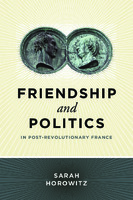Friendship and Politics in Post-Revolutionary France
Author(s)
Horowitz, Sarah
Collection
Knowledge Unlatched (KU)Number
100090Language
EnglishAbstract
In Friendship and Politics in Post-Revolutionary France, Horowitz brings together the political and cultural history of post-revolutionary France to show how French society responded to and recovered from the upheaval of the French Revolution. The Revolution led to a heightened sense of distrust and divided the nation along ideological lines. In the wake of the Terror, many began to express concerns about the atomization of French society. Friendship was regarded as one bond that could restore trust and cohesion. Because trust and cohesion were necessary to post-revolutionary parliamentary life, politicians turned to friends and ideas about friendship to create solidarity. Relying on detailed analyses of politicians’ social networks, new tools from the digital humanities, and examinations of behind-the-scenes political transactions, Horowitz makes clear the connection between politics and emotions in the early nineteenth century, and reevaluates the role of women in political life.
Keywords
History; Amable Guillaume Prosper Brugière; baron de Barante; France; François Guizot; François-René de Chateaubriand; Individualism; July Monarchy; Liberalism; PoliticsDOI
10.26530/oapen_625754ISBN
9780271061924OCN
1028763112Publisher
Penn State University PressPublisher website
http://www.psupress.org/Publication date and place
University Park, PA, 2014Classification
History


 Download
Download